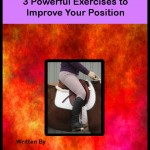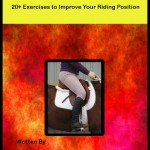10 Tips for Banishing Competition Riding Nerves
Here Is an Article From HorseandHound.co.uk in its entirety.
This is an excellent article with some very good ‘actionable’ tips.
Please visit HorseandHound.co.uk for other excellent stories.
Anyone who has experienced competition riding nerves will know just how debilitating they can be. We asked Danielle Olding, of From The Neck Up, how to eliminate competition riding nerves.
Danielle says: “Nerves are the brain’s way of alerting us to potential dangers and protecting us from doing anything rash. Many of experience clear symptoms from anxiety, doubt and negative thoughts, through to nausea, sweating, migraines, or an increase in breathing and heart rate.”
Sound familiar? Well the good news is, nerves can help our riding — they speed up our reactions and make us ride with more purpose. The bad news is, for some, they have the opposite effect, making competing an emotional trial.
The trick, Danielle says, is to learn to work with your emotional responses, channelling them into the job in hand rather than trying to eradicate them altogether. Here she explains how.
1. Understand the positive intention behind the nerves. Are you concerned for personal safety, delivering a competent performance in front of others or is it something else? Find a positive, practical way to satisfy this concern, so your brain can relax and not feel the need to press the warning buzzer.
2. Identify any possible causes behind your nervousness, such as a previous bad experience, and get some professional help to scramble your brain’s recollection of events.
3. Notice what process you are going through in your head to generate your nervous reaction. Are you creating pictures of everything that might go wrong, or are you using a running commentary to talk yourself into a negative state? Try changing the order in which you do things in your head. Change the volume, location or tone of the voice. Make colour pictures black and white, big pictures small, close pictures far away, movies into still shots, disaster into success.
4. Take the word “nervous” out of your vocabulary, both in your outward conversations and in your inward thought dialogue. Replace it with the word “excitement”. You’ll be amazed how your brain will adapt and generate a totally different state.
5. Keep yourself in the present. There is nothing a ‘What if’ junkie loves more than to catastrophise and create a damn good drama. If this is you, get a job writing thrillers. This marvellous skill has no place in the real world. Our horse has no comprehension of the nightmare you have on continual replay in your head. Learn to stay firmly rooted in what is actually happening underneath you right now. There is more chance of Richard Branson toppling out of his Air Balloon half way through your round than your elaborate script joining the ranks of reality Try to recall any rare occasions in your riding career when you didn’t die, or get banished from the venue on account of your hopeless riding, and compare this to the number of times in your career when you did. This should give you a better sense of reality.
6. Learn to keep your body physically relaxed. If you can keep your body soft and relaxed, your brain finds it very hard to generate a negative emotional state (because it associates a soft, relaxed body with a happy, confident emotional state). The best way to keep your body soft is to breathe. Learn to ride with slow breathing based low, behind your belly button. If you get really good, you can synchronise your slow breathing to the horse’s strides in any pace, this will help you maintain your breathing and a good rhythm.
7. Learn to ride with a soft jaw. Think back to how your jaw felt last Saturday night on your way home from the pub. Your jaw needs to be totally floppy and ‘disconnected’ and the rest of your body will soften with it. It is impossible to have a soft, relaxed body if your jaw is tight. So all you actually have to do is open your mouth very slightly and keep the jaw ‘floppy’. Learn to do this in downward transitions, lateral work, collection and coming over poles and fences until you can keep it totally uninvolved all the time.
8. Start riding in peripheral vision. Peripheral vision is another thing that your body naturally does when it is relaxed. Put yourself into it directly, and your brain assumes that you must be relaxed and everything is ok with the world. It is that soft, blurry gaze where your eyes remain firmly fixed on one spot out in front of you whilst taking in everything around you by way of vague shapes, colours and movement. Learning to ride like this makes it difficult for your brain to generate a negative state because it is not natural. It will also improve your balance and sense of feel.
9. Actively create images and movies of you riding confidently. You have to teach your brain to do this. Take a few minutes three times per day to mentally rehearse yourself using one or more of these tips every time you ride, out hacking, or in competition, until your brain starts to develop them as a habit.
10. Remember, confidence is like a muscle, the more we use it, the stronger it gets.
From the Neck Up is led by Danielle Olding. Danielle is an experienced Business, Executive and Sports, Coach who is CIPD qualified and is also a trainer member of the the Association of NLP and the International Coaching Federation. She is an NLP Trainer, Master Sports Practitioner and UKCC Level 3 Accredited Coach.
For more info, visit: www.fromtheneckup.co.uk
Take a look at our tips for competing with your horse alone
Read more at http://www.horseandhound.co.uk/features/10-tips-for-banishing-competition-riding-nerves/#2BA2GUcPqIPzLE2W.99
http://www.horseandhound.co.uk/features/10-tips-for-banishing-competition-riding-nerves/




 Try these three powerful exercises to get strengthen your position.
Try these three powerful exercises to get strengthen your position.
